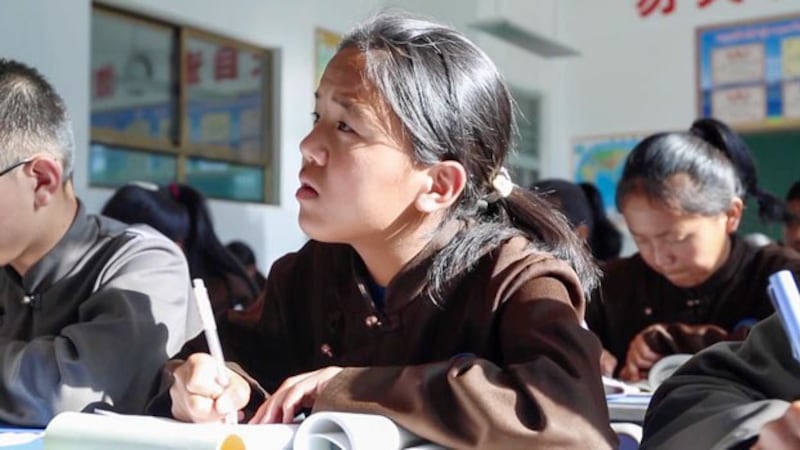Chinese authorities are requiring the parents of students who attend a Buddhist school in a Tibetan area of western China to enroll their children in state-administered residential schools, Tibetans with knowledge of the situation said.
Earlier this month, Radio Free Asia learned that Chinese authorities had closed down the Buddhist school of Lhamo Kirti Monastery in Dzoge county, Sichuan province, affecting about 600 students. Another school at Kirti Monastery in Ngaba county was also shut down, affecting 1,000 students.
Authorities said students at both schools had not attained the age at which they could receive monastic education — now set at 18 — though children as young as 5 or 6 years old previously were allowed to enroll in monastery schools, sources told RFA in the earlier report.
RELATED STORIES
[ China’s controversial boarding school policy for Tibetans explainedOpens in new window ]
[ China shuts renowned Tibetan private school, sparking outcryOpens in new window ]
[ China closes 2 Tibetan monastery schools, sends novices to state boarding schoolsOpens in new window ]
Now, more than 300 students, ages 6 to 14, at the Lhamo Kirti Monastery school must enroll in what critics of Chinese policies in Tibet call “colonial-style” boarding schools, where young Tibetans are separated from their families and taught a Chinese-language curriculum that promotes loyalty to the Chinese Communist Party, the sources said.
Efforts are being made to allow another 200 students, ages 15 to 18, to remain at and attend the Buddhist school, one of the sources said.
Tibetans and rights activists say dozens of such school closures in recent years are part of the Chinese government’s systematic efforts to assimilate Tibetans by wiping out their culture, language and religion.
“Parents are currently required to send their children to state-administered residential schools and sign written agreements not to enroll them in any other schools or monasteries until they reach adulthood,” said a Tibetan from Lhasa who declined to be identified so he could speak freely.
“This move was made under the guise of enforcing the compulsory education system established by the Chinese government,” he said.
Tibetan as medium of instruction
Parents of Children at the Lhamo Kirti Monastery school must sign a document — a copy of which was obtained by RFA — confirming that their children are enrolled in a state-run boarding school in accordance with Article 16 of China’s Law on the Protection of Minors.
That article states that parents who work in other places and can’t perform their guardianship duty with respect to minors shall entrust other adults who have the ability to act as guardians with such duty.

The document sent to parents also specifies that once they receive the notice, they must prepare their children to attend a residential school beginning in September.
Though Tibetans have argued that sending their children to Buddhist schools does not violate Chinese law, government authorities have accused them of brainwashing the children with the curriculum taught in the Buddhist schools, sources said.
Unlike state-run boarding schools, Buddhist schools teach Tibetan literature, English and Buddhist philosophy as subjects using the Tibetan language as the medium of instruction.
Founded in 1986, the school at Lhamo Kirti Monastery — known among locals as Taktsang Lhamo Kirti Monastery — initially offered three classes held in the monastery’s hall and monks’ residences.
In 1993, a separate school called Taktsang Lhamo Tibetan Culture school was established, but it faced interference from the Chinese government when officials ramped up restrictions on the study of the Tibetan language and Buddhist philosophy, ultimately leading to its closure.
The monastery’s primary school later reopened and served novice monks under the age of 18 and children from nearby nomadic areas.
Translated by Tenzin Dickyi and edited by Tenzin Pema for RFA Tibetan. Edited by Roseanne Gerin and Matt Reed.
